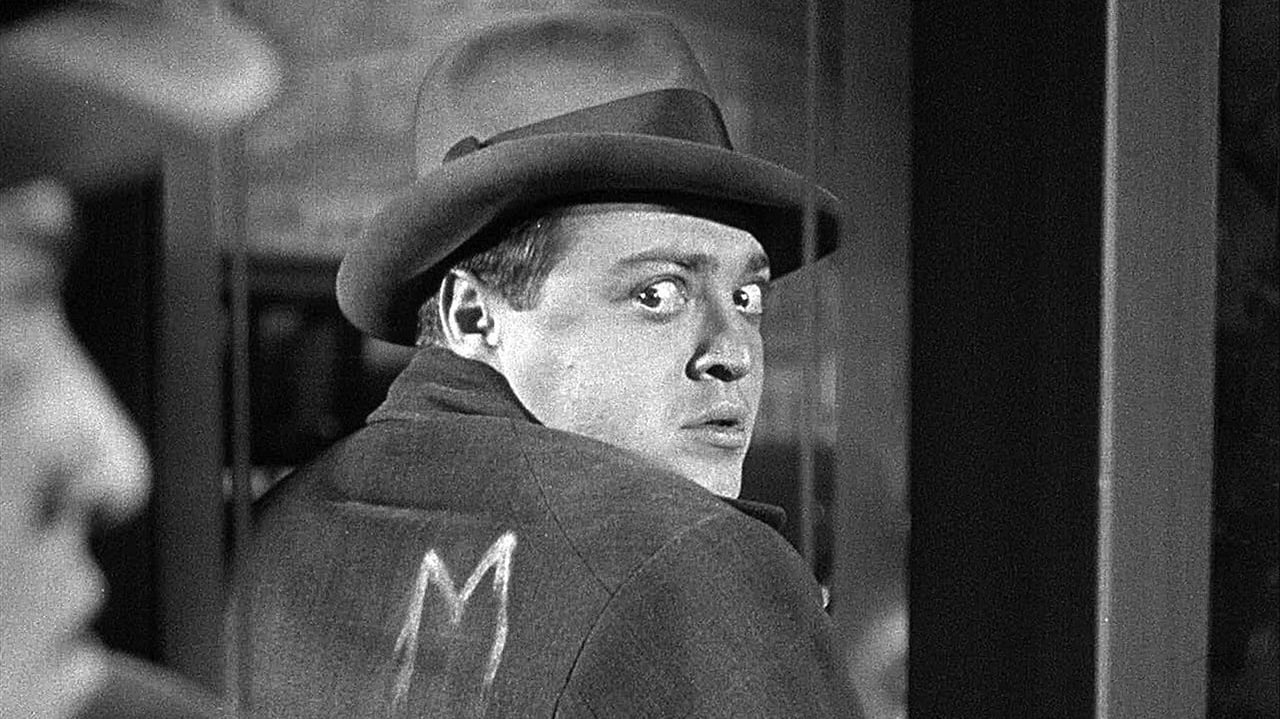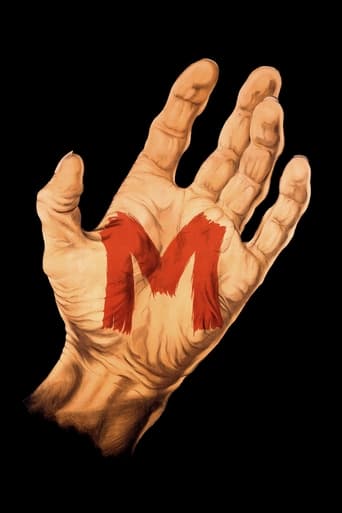ElMaruecan82
M like Manichean? What can you say of a plot driven by criminals and where good people are rather inefficient for the most part and where the most despicable character earns our own sympathy. This is a movie using such stark black-and-white contrasts, noir in its soul and gray in its core.M like Mob Mentality? Fritz Lang personal "J'accuse" against a system where accusers aren't all innocent. M like Maturity? The film also consecrates German Expressionism as a peak of creativity and social relevance, a sequence in history where Berlin became, literally, the best area and arena of expression to an art that had reached its maturity. Or M like Mörder, murderer in German, Maudit in French (doomed) and Masterpiece in the universal language of cinema.M like Menace (and Music). Children are singing an elimination game of ominous undertones, later we see little Elsie playing with the balloon, a shadowy silhouette appears, the face remains unrevealed while we hear the whistling of "In the Hall of Mountain King". Before the 'shark' theme in "Jaws" to the "Psycho" shrieking violins, the "Peer Gynt" tune became the first notable leitmotif meant to suggest an evil presence, the perfect device to put us in the victims' standpoint for the first act, as powerlessly as the poor mother calling Elsie while her balloon (the bait used by Hans Beckert) is drifting along the telephone wires. The effects are then shown through the growing fame of the new 'Jack the Ripper' figure, the ensuing paranoia with any adult basically talking to a child is assaulted. The killer is a menace to an already crisis-stricken society, forcing the police department to triple the efforts: psychiatric cases are explored, handwriting analyzed and daily and nightly raids operated to make further pressure on the criminal world. M for Methodic. For its second act, "M" iss the seminal police procedural.While covering that angle with a documentary-like precision, Lang still seems dubious about the police's efficiency and provides an interesting twist by paralleling the work of the law with the outlaws'. In a long sequence where both sides brainstorm about the methods to use to find him, we swing back and forth from one world to another and the only indicator of the side of the law we're put in is the presence of uniform, last time I saw criminals acting like politicians in a masterpiece, it was in "The Godfather". One even points out insightfully that the killer must be a bourgeois, because it's the very standard of life that provides the level of idleness driving any easily corruptible mind to the most extreme corners.
M like the sign on the shoulder.So in a famous sequence, criminals, helped by the street beggars find Hans Beckert quicker than the police force, he was betrayed by his trademark whistling and (irony) a little girl who noticed the infamous letter marked on his shoulder. The following chase takes maybe too much time for the film's own good. Not saying the film could do without the struggle to catch him but the court is such a high point of cinema's history that the previous part seems more forgettable. And Peter Lorre with his round face, innocent eyes when he's cornered like a rat and utters his memorable speech, gives the performance of a lifetime, as a living symptom, a man incarnating the sickness of a society where bad people toy with justice and the worst of all acts as childishly as his victims, claiming innocence with such rabid eloquence he's almost convincing.Beckert says he can't control his impulses, a little voice urges him to commit the irreparable acts and his body language is simply gut-wrenching when he simply can't put "words". His 'lawyer' makes a good point about the past of some accusers, whose Becket call hypocrites because they could choose to be honest, but the accusers retort that whether he's responsible or not, he's still a menace. Sure, whether their reasons are selfish or ethical is debatable but can we empathize with Beckert?M like Modernity. Looking at Twitter or Youtube or Facebook comments today, you can tell there's something ferocious and still on-going about mob mentality and a film like "M" could be deemed as feeble and liberal in the way it provides a tribune to a child molester, the worst possible crime.M like Multilayered.Yet there are some powerful truths hiding underneath the thriller, the truth about a society sick of its own contradictions, determined to impose standards of morality (white) and condemning true crimes (black) but indulgent toward activities that have no worse repercussion. That the film ends with black-clad mothers admitting their own responsibility is perhaps the most optimistic thing about "M", the sentence doesn't matter, what matters is the lesson behind... but did German learn the lesson?Ironically, one could have seen the rise of the Nazi empire as the antidote, like Thea Von Sarbou who wrote the film and worked for the Nazi regime, other could also see it as its worst possible consecration like director Fritz Lang. That he didn't side with the criminals at the end emphasizes an intuitive comprehension of his world and allowed this film to be hailed as a true, intelligent, nightmarish and alas, premonitory masterpiece.. with M as the mark of a disillusioned genius.M like Meditative? Mysterious? Mantic?Interestingly, the French title is "M le Maudit", meaning the doomed one, as if Beckert was the living incarnation of a doomed society, as if there was indeed something rotten in the Weimar Republic and It wouldn't get any better after but could Fritz Lang anticipate it? Looking up his second masterpiece "M", I was wondering whether Lang reflected his own rejection of German society or cared enough to warn the audience against the impending doom of decadence. Surely, the director behind "Metropolis" could only pinpoint with the accuracy of a soothsayer the limits of a civilization that might take its heritage for granted.
TheNabOwnzz
M has to be one of the most influential movies ever made, both technically and psychologically. With an outstanding Peter Lorre, suspense that outsuspenses Hitchcock, excellent cinematography and a deep sociological layer added to it, M is one of the masterpieces of the psychological thriller genre.It is a film devoid of typical humanitarian propaganda, yet it is not the case that we immediately feel the need to relate to the child murderer Hans Beckert ( Peter Lorre ) since Fritz Lang also shows us the effects his gruesome crimes have in the form of the police constantly raiding establishments, the grieving parents & random people accusing eachother of the murders. It is not a movie that forces its opinion on you, but causes you to think about what is truly right and wrong. Hans later claims he cannot help himself because he has an irresistible compulsive urge to kill which cannot be stopped, much to the dismay of other career crooks who claim they only commit crimes to survive and take no pleasure or feel no compulsion towards it. It is a psychological kind of movie that is still as relevant as ever today as it was in 1931.Peter Lorre is ofcourse the perfect fit for the psychopathic child murderer, he has the perfect innocent wide eyed look for a psychopath, who seems to even be likeable when he is not murdering children. His signature whistle by Edvard Grieg - In the Hall of the Mountain King is a nice creepy addition to his character which he uses to lure kids to their doom. Ofcourse the incredible shot at the start which focuses on Hans's shadow on the poster that lists his crimes and reward for capture while talking to a little girl before killing her is a great ironic symbolism to announce his character.It was Lang's first sound picture, yet only two third of the movie was shot with actual sound while everything else was shot silent. This was primarily to keep the costs down since sound equipment was very expensive at the time. It creates a weird mix in constant transitioning from silent to sound. Yet as Lang has stated it adds another layer to the eeriness the movie has, so it only enhances the experience instead of unimmersing you out of the film. The cinematography is revolutionary in its use of low key lightning, which is a technique that was used many times after in the classic Film Noir era in Hollywood. The result is many Film Noirs share a visual resemblance with M due to their dark tone. Not only visually, but psychologically many themes of M have been repeated throughout the years in cinema. It was one of the first instances of a semi-sympathetic look on a pure psychopathic murderer, which has been repeated countless times in later years.Some might feel sorry for Beckert for having this affliction of which he cannot be helped while others would prefer to see him hang, the movie doesn't shove the right answer down our throats, and it's possible to look at it from either way without having a right answer. It is a sociological thinking man's picture that is as relevant now as it ever was.
meathookcinema
This film works on many different levels.Firstly, its a cracking horror film/thriller about a child murderer on the loose in the Berlin of 1931. Lang's use of framing and lighting is a revelation and would prove highly influential in the wider medium of film. The film is also an amazing snapshot of Germany at the time, post World War I. A broken down society that is in need of repair with its people looking to different authority figures for a solution.Finally, the film has many things to say about crime and punishment. But it also has a lot to say about justice. The killers crimes are abhorrent but there are no crimes that don't warrant a fair trial. When the baying crowd with murder on its mind needs to satify its bloodlust, will it just be those who are guilty that are next in their sights? This film was made when the Nazi Party were starting to rise in popularity. Which makes this film even braver and brilliant.An audacious, daring piece of art.

